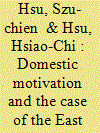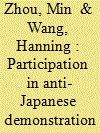| Srl | Item |
| 1 |
ID:
154652


|
|
|
|
|
| Summary/Abstract |
China's declaration of an air defense identification zone (ADIZ) in the East China Sea shocked the international community, and many explanations have been offered about the motivation behind it. We argue that domestic politics played a key role in the ADIZ policy. However, existing studies have not paid sufficient attention to decisionmakers' political motivation. To fill this gap, we explore two distinct models: the diversionary foreign policy model and the mobilization model. Both models focus on the linkage between the state leader's domestic political consideration and foreign policy behavior, but each has different theoretical and empirical implications. Our findings suggest that the mobilization model offers a better explanation of the motivation for China's move.
|
|
|
|
|
|
|
|
|
|
|
|
|
|
|
|
| 2 |
ID:
148521


|
|
|
|
|
| Summary/Abstract |
Nationwide anti-Japanese demonstrations have erupted in China periodically in recent years. This study investigates what factors make university students more motivated to participate in anti-Japanese demonstrations. We collected original data on 1,458 university students in Beijing in June 2014, inquiring about both actual and possible future participation. We find that students are more willing to participate in future demonstrations (1) when they believe that anti-Japanese demonstrations benefit China's diplomacy (instrumentality), and (2) when they have prior demonstrators in their social networks (diffusion). However, when it comes to actual participation, only diffusion plays a significant role while instrumentality does not. While students claim that they are motivated by beliefs that demonstrations will matter for China's diplomacy, they actually turn out only when networks operate. In addition, membership in the Chinese Communist Party (CCP) does not affect prospective participation but deters actual participation. The CCP actually discourages participation in recent anti-Japanese demonstrations.
|
|
|
|
|
|
|
|
|
|
|
|
|
|
|
|
| 3 |
ID:
127892


|
|
|
|
|
| Publication |
2014.
|
| Summary/Abstract |
In the last decade the concept of disaster diplomacy has drawn interest to the links between major natural disasters and international conflict. This paper reviews the disparate set of works covering this relationship. This body of work, which draws on multiple disciplinary traditions extending over three generations, holds vast potential for political scientists that seek to understand the intersection of ecological catastrophe and politics. The latest wave of publications has the greatest potential to yield valuable and generalizable insight into political phenomena as well as to produce practical knowledge for disaster-related organizations and agencies, policymakers, and citizens. This paper reviews the three generations of literature and then makes suggestions along three lines of argument: (1) refining definitions of variables, (2) refining the concept of 'disaster diplomacy', and (3) using existing theories and concepts of interstate conflict.
|
|
|
|
|
|
|
|
|
|
|
|
|
|
|
|